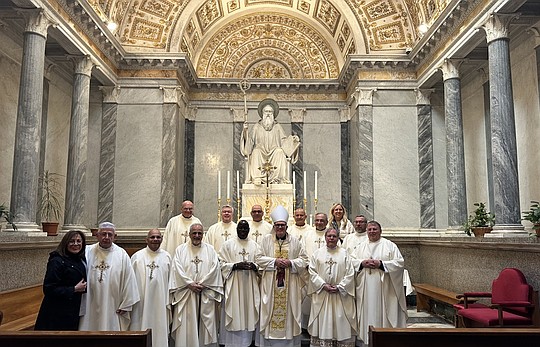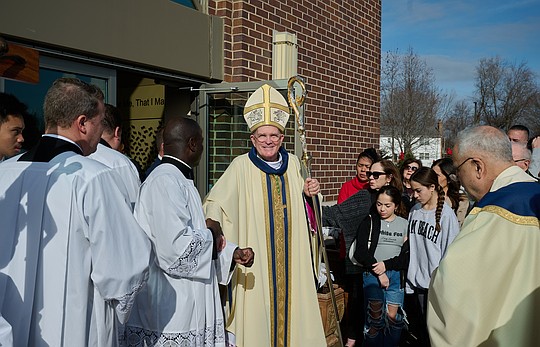What we as Church can learn from Mardi Gras
February 16, 2023 at 1:48 a.m.

And yet, who we are, where we are, and when we live matter because these factors influence how we express our faith. And that can be challenging. At times, our expressions of faith take shapes so distinct from one another – with such diverse color and texture – that we can lose sight of the underlying unity from which all that richness flows. This brief season of Ordinary Time is a case in point.
With Christmas in the liturgical rearview mirror, most Catholics turn their attention to what’s next: Lent. That’s why publishers, institutes and organizations have promoted their Lenten resources online ever since Epiphany – some even before. Parish missions and formation initiatives focused on prayer, fasting, and almsgiving are already being publicized. But this leap to Lent does not happen everywhere. Consider New Orleans.
Before moving to south Louisiana, we had no clue what Mardi Gras was all about. Before we experienced it for ourselves, we (like many) were convinced that Mardi Gras was simply an excuse for debauchery, excess, and sin – the antithesis of what sincere Christian discipleship looks like.
[[In-content Ad]]
We’ve since discovered that Mardi Gras in the Gulf South – the former colonies of France and Spain – isn’t just a day; it’s a season determined by the Church’s calendar. More accurately referred to as “Carnival,” the festivities go from Epiphany until Ash Wednesday and the whole city comes alive. People stand in early morning lines to buy King Cake from their favorite bakery. They decorate their houses, dress in gold, green and purple, attend masquerade balls and banquets, and they march or ride floats in flashy parades. Crowds line miles of city streets as festivities crescendo in the final two weeks before Fat Tuesday. In New Orleans alone, there are more than four dozen parades sponsored entirely by “krewes” – clubs or private organizations that exist for the whole purpose of celebrating Carnival.
Mardi Gras parades aren’t like anything we’d ever seen elsewhere. The biggest difference is that there are no spectators; everyone is a participant. Thousands show up with signs and glittery costumes to set up canopies, coolers, and grills along the streets. Parading krewe members throw beads and coveted hand-decorated trinkets to the throng – especially to young children buckled into seats atop step ladders. Marching bands and dance troupes are placed between the bigger props or floats, many of which are two stories high. With few exceptions, it’s an experience of pure and unbridled joy, an extravagant gift people here give to one another.
It's not surprising that a production of this scale involves commitments and preparations that take up most of the year. The people who do the lion’s share of the work to preserve and hand on these rich traditions are respected “culture bearers.” But even riders in the smallest parades make a significant investment of time and money. I can’t help but think that our Church needs more people like these, not only to live our traditions but to invite everyone around them to join in – to leave no mere spectators in the pews.
There’s a well-established place for penance in our faith. As Catholics, we know that repentance is a good and necessary thing. But what about joy? What would happen if we allowed ourselves to really celebrate ordinary times (without sinning in the process)? Many of us may never know. Some of us may be a little afraid to ask.
I think Mardi Gras has something to offer the Church: a model and remedy for discipleship that too often looks like drudgery rather than delight, especially to the eyes of those who don’t have faith.
Lent will be here soon, and not every expression of faith should be somber and serious, or even highbrow. In fact, I’d suggest that they had better not be. We need to make room for color and crowds and build a place for the kind of faith that has the power to lift what is full, active, and conscious to the realm of unmitigated and visible joy.
Jaymie Stuart Wolfe is a sinner, Catholic convert, freelance writer and editor, musician, speaker, pet-aholic, wife and mom of eight grown children, loving life in New Orleans. "Called to Holiness" appears biweekly at OSV News.
Related Stories
Saturday, January 03, 2026
E-Editions
Events
And yet, who we are, where we are, and when we live matter because these factors influence how we express our faith. And that can be challenging. At times, our expressions of faith take shapes so distinct from one another – with such diverse color and texture – that we can lose sight of the underlying unity from which all that richness flows. This brief season of Ordinary Time is a case in point.
With Christmas in the liturgical rearview mirror, most Catholics turn their attention to what’s next: Lent. That’s why publishers, institutes and organizations have promoted their Lenten resources online ever since Epiphany – some even before. Parish missions and formation initiatives focused on prayer, fasting, and almsgiving are already being publicized. But this leap to Lent does not happen everywhere. Consider New Orleans.
Before moving to south Louisiana, we had no clue what Mardi Gras was all about. Before we experienced it for ourselves, we (like many) were convinced that Mardi Gras was simply an excuse for debauchery, excess, and sin – the antithesis of what sincere Christian discipleship looks like.
[[In-content Ad]]
We’ve since discovered that Mardi Gras in the Gulf South – the former colonies of France and Spain – isn’t just a day; it’s a season determined by the Church’s calendar. More accurately referred to as “Carnival,” the festivities go from Epiphany until Ash Wednesday and the whole city comes alive. People stand in early morning lines to buy King Cake from their favorite bakery. They decorate their houses, dress in gold, green and purple, attend masquerade balls and banquets, and they march or ride floats in flashy parades. Crowds line miles of city streets as festivities crescendo in the final two weeks before Fat Tuesday. In New Orleans alone, there are more than four dozen parades sponsored entirely by “krewes” – clubs or private organizations that exist for the whole purpose of celebrating Carnival.
Mardi Gras parades aren’t like anything we’d ever seen elsewhere. The biggest difference is that there are no spectators; everyone is a participant. Thousands show up with signs and glittery costumes to set up canopies, coolers, and grills along the streets. Parading krewe members throw beads and coveted hand-decorated trinkets to the throng – especially to young children buckled into seats atop step ladders. Marching bands and dance troupes are placed between the bigger props or floats, many of which are two stories high. With few exceptions, it’s an experience of pure and unbridled joy, an extravagant gift people here give to one another.
It's not surprising that a production of this scale involves commitments and preparations that take up most of the year. The people who do the lion’s share of the work to preserve and hand on these rich traditions are respected “culture bearers.” But even riders in the smallest parades make a significant investment of time and money. I can’t help but think that our Church needs more people like these, not only to live our traditions but to invite everyone around them to join in – to leave no mere spectators in the pews.
There’s a well-established place for penance in our faith. As Catholics, we know that repentance is a good and necessary thing. But what about joy? What would happen if we allowed ourselves to really celebrate ordinary times (without sinning in the process)? Many of us may never know. Some of us may be a little afraid to ask.
I think Mardi Gras has something to offer the Church: a model and remedy for discipleship that too often looks like drudgery rather than delight, especially to the eyes of those who don’t have faith.
Lent will be here soon, and not every expression of faith should be somber and serious, or even highbrow. In fact, I’d suggest that they had better not be. We need to make room for color and crowds and build a place for the kind of faith that has the power to lift what is full, active, and conscious to the realm of unmitigated and visible joy.
Jaymie Stuart Wolfe is a sinner, Catholic convert, freelance writer and editor, musician, speaker, pet-aholic, wife and mom of eight grown children, loving life in New Orleans. "Called to Holiness" appears biweekly at OSV News.










